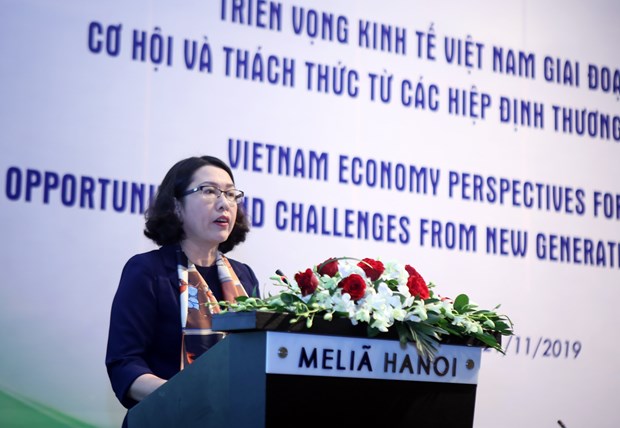Vietnamese economy forecast to grow 7 percent during 2021-2025
Vietnam’s gross domestic product (GDP) is forecast to expand 7 percent during 2021-2025 on the back of new-generation free trade agreements, according to the Ministry of Planning and Investment’s National Centre for Socio-Economic Information and Forecast (NCEIF).
 NCEIF Director Tran Thi Hong Minh speaks at the conference. (Photo: VNA)
NCEIF Director Tran Thi Hong Minh speaks at the conference. (Photo: VNA)Hanoi (VNA) – Vietnam’s gross domestic product (GDP) is forecast to expand 7 percent during 2021-2025 on the back of new-generation free trade agreements, according to the Ministry of Planning and Investment’s National Centre for Socio-Economic Information and Forecast (NCEIF).
At a workshop “Vietnam Economy Perspectives for 2021-2025: Opportunities and Challenges from New Generation Free Trade Agreements” in Hanoi on November 21, NCEIF Director Tran Thi Hong Minh stressed free trade deals, particularly the Comprehensive and Progressive Agreement for Trans-Pacific Partnership (CPTPP) and the EU–Vietnam Free Trade Agreement (EVFTA) will have enormous impacts on the economy during the period.
She held that the CPTPP and EVFTA have wider range of commitments than other free trade pacts as they cover import and export terms while setting production methods for goods exchanges. In general, they have positive influence on economic growth, especially in markets of the signatories.
The EVFTA and CPTPP could help increase Vietnam’s GDP by 4.3 percent and 1.3 percent, respectively by 2030, she said, adding shipments to the EU are expected to surge some 44.4 percent by 2030 while those to CPTPP member states are forecast to pick up 14.3 percent by 2035.
“They will exert influence on the Vietnamese economy in mid- and long-terms as they put pressure on the Government to improve institutions and business climate”, she said.
There is a strong possibility that the GDP growth could reach 7 percent per year during 2021-2015, with stable macro-economy, inflation rate projected at 3.5-4.5 percent each year and labour productivity growth reaching around 6.3 percent per year.
In another scenario, Vietnam’s GDP could expand 7.5 percent if the country can take advantage of the Fourth Industrial Revolution, improve quality of investment attraction, and well develop the modern economy.
Meanwhile, Tran Toan Thang, an official from the NCEIF, said the EVFTA and CPTPP’s commitments are higher than WTO in terms of investment openness, investment protection and dispute settlement, and they help Vietnam promote exports as well as improve supply chains.
Although Vietnam can improve its competitive capacity in terms of market scale and labour productivity, it could take time for the country to better infrastructure, innovation and technology readiness.
Therefore, the country should work more to renew its growth model, accelerate key drivers of economic growth, and make good use of opportunities from global integration, science-technology development and the Fourth Industrial Revolution, he suggested./.













